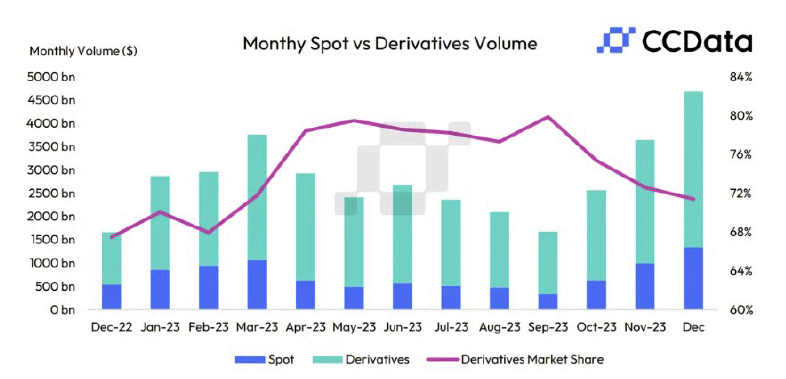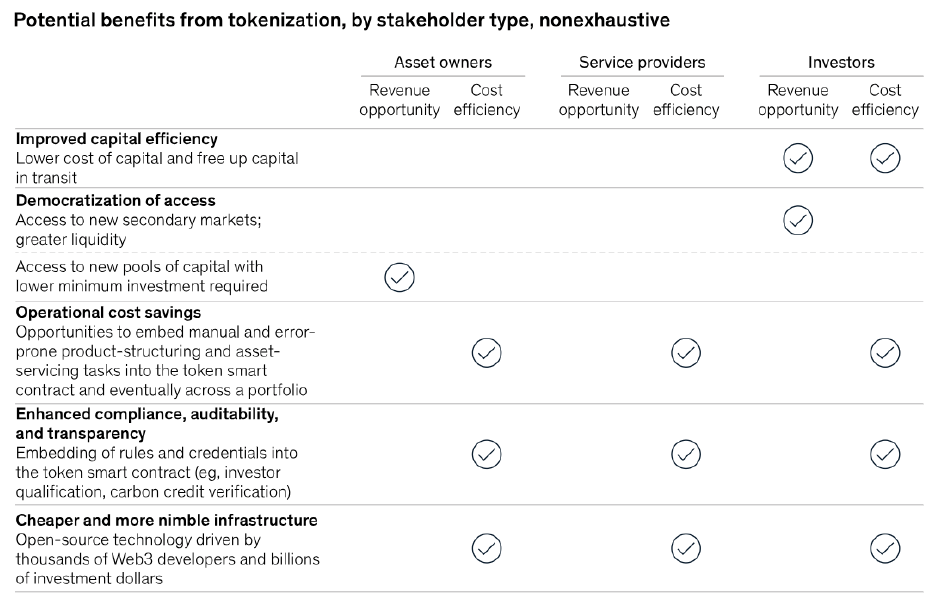
In the week following the U.S. Securities and Exchange Commission’s January 10 vote to authorize 11 spot bitcoin exchange-traded funds, bitcoin funds led by BlackRock and Fidelity enjoyed upwards of $1.8 billion in total inflows. Does this apparently healthy, pent-up demand have bigger and broader implications for cryptocurrencies and their future commercial prospects?
CEO Larry Fink of BlackRock, whose iShares Bitcoin Trust surpassed $1 billion in the first four days of trading, declared in a CNBC interview: “ETFs are step one in the technological revolution in the financial markets. Step two is going to be the tokenization of every financial asset.”
That does not directly address or dismiss long-standing claims that bitcoin is the start of a money-and-payments revolution that will disrupt if not displace fiat currencies. The speculative risks of bitcoin investing have not gone away.
Yet tokenization of so-called real world assets is enticing to Fink and many of his peers in institutional finance, as an opportunity to remake asset management and a host of transaction types on a blockchain, or distributed ledger technology (DLT), foundation.
“Industry experts have forecast up to $5 trillion in tokenized digital-securities trade volume by 2030,” said an October 2023 McKinsey & Co. article. Despite years of hype, however, “it hasn’t yet caught on in a meaningful way.”
“Short term, [the SEC rule] is quite important,” said David Easthope, senior analyst and head of fintech research at Coalition Greenwich. “This will help legitimize the asset class outside of family offices and hedge funds to institutional investors as well those who are seeking more simplistic structures to gain exposure.”

In December, a 34% rise in spot trading volume and 26% in derivatives – reaching a combined $4.68 trillion – on centralized exchanges capped three months of increases spurred by anticipation of spot bitcoin ETF authorization in the U.S., according to CCData’s Exchange Review.
As they attract investment allocations, new exchange-traded products generate servicing business for the likes of Jane Street Capital, JPMorgan Securities and Cantor Fitgerald, supporting funds through authorized participant (AP) relationships.
Asset servicers with digital-asset business units, including Bank of New York Mellon and State Street Corp., have been waiting in the wings. A BNY Mellon spokesperson confirmed it will provide fund administration, accounting, transfer agency and ETF-specific services to bitcoin ETF providers BlackRock, Grayscale, ARK Invest, Invesco, Bitwise and Franklin Templeton.
“These services are for our asset management clients, so [they] would be buy-side/institutional-investor focused,” the spokesperson said.
Lingering Misgivings
The spot bitcoin ETF rule was a split 3-2 decision, and heat from the debate lingers.
Chair Gary Gensler conceded in his public statement that after the SEC lost an appeals court ruling on an exchange-traded product application submitted by Grayscale, “I feel the most sustainable path forward is to approve the listing and trading of these spot bitcoin ETP shares.”
Gensler, who has couched his policy stance in a desire to rein in crypto’s “wild west” aspects, concluded by stating that in approving the listing and trading of certain spot bitcoin ETP shares, “we did not approve or endorse bitcoin. Investors should remain cautious about the myriad risks associated with bitcoin and products whose value is tied to crypto.”
Commissioner Caroline Crenshaw, a Democratic appointee as is Gensler, did not join him in siding with the SEC’s two Republicans. The actions “are unsound and ahistorical. And worse, they put us on a wayward path that could further sacrifice investor protection,” went Cresnshaw's dissent. “I cannot agree that these actions serve either our statutory or foundational investor protection mandates.”
Senator Elizabeth Warren, Democrat of Massachusetts, tweeted on January 11: “The @SECgov is wrong on the law and wrong on the policy with respect to the bitcoin ETF decision. If the SEC is going to let crypto burrow even deeper into our financial system, then it’s more urgent than ever that crypto follow basic anti-money laundering rules.”
Mark Hays, senior policy analyst, Americans for Financial Reform Education Fund, said in a statement, “We are disappointed the SEC approved these filings despite endemic market manipulation and investor risks found in crypto-asset markets, which led to billions in consumer losses during the recent crash. This step will expose a much larger group of investors to that same risk. And, this approval provides the crypto industry with an imprimatur of legitimacy that it has craved but not earned.”
“The conditions that make the market for bitcoin ripe for manipulation and fraud remain,” the interest group said, with Hays adding: “At a minimum now, the SEC and other regulators should provide investors, consumers and other financial sector players with more information about the unique risks and harms present in crypto markets.”
Vanguard Group, second to BlackRock in total ETF assets under management, did not join the fray. It has no plans to offer “bitcoin ETFs or other crypto-related products – our perspective is long-standing that cryptocurrencies’ high volatility runs counter to our goal of helping investors generate positive real returns over the long term,” a spokesperson said, as reported by The Block.
Will Floodgates Open?
For Republican SEC Commissioner Hester Peirce, popularly dubbed “Crypto Mom” in cryptocurrency circles, it was more a case of, Why did it take so long? She called the approval “the end of an unnecessary, but consequential, saga,” reiterated her position that ETPs are “an important innovation,” noted that bitcoin ETPs have established themselves in foreign jurisdictions and on Commodity Futures Trading Commission-regulated derivative exchanges, and asserted that the protracted approval process drove “retail investors to less efficient means of attaining bitcoin exposure in the securities markets.”
In a like-minded postmortem out of Cato Institute, Jack Solowey and Jennifer Schulp wrote, “While crypto critics accuse the technology of having no use case, or only being useful for speculation, others apparently see things differently.” In the interest of portfolio diversification, “for some, risk-on alternative assets may include bitcoin, and an ETF is a relatively straightforward way to gain exposure.”
London-based ETC Group launched its Deutsche Börse-listed BTCE bitcoin ETP in June 2020, and, last April, the first crypto ETP referencing an MSCI index, DA20. ETC chief strategy officer Bradley Duke said the U.S. bitcoin ETF approval, along with a Hong Kong Securities and Futures Commission announcement that it will also allow such instruments, “goes far to legitimize bitcoin as an investable global asset. Here in Europe, we have had secure and efficient spot bitcoin ETPs for over 3.5 years, and we are spoiled for choice with the range of physically backed crypto ETPs available, including many different single-asset crypto ETPs as well as broad market index products.”
Michael Silberberg, head of investor relations at crypto hedge fund Alt Tab Capital, commented, “In the short term, we expect continued frothy price accumulation on this news as capital flows into the market from a new class of institutional buyers to crypto looking to hedge with BTC, make these products part of their treasury management. He recalled that “gold jumped approximately 250% four months after its first ETF approval and launched an eight-year bull run,” but added, “Even as we welcome these vehicles to the market, it’s important to remind investors of all classes that these vehicles will come with restrictions such as cash-only creation/redemption and liquidity tied to market hours.”
According to a July 2023 report from PwC and the Alternative Investment Management Association, 29% of traditional hedge funds were investing in crypto assets, down from 37% the year before. However, the average allocation to crypto assets managed by these funds rose to 7%, from 4%, while 37% of those that were not currently investing in crypto said they were curious and awaiting further asset maturity.
“Traditional hedge funds, committed to the market in the longer term, are not only increasing their crypto assets under management, but also maintaining – if not increasing – the amount of capital deployed in the ecosystem,” John Garvey, PwC global financial services leader in the U.S., observed.
“The reality is that investors seem intent on incorporating crypto into their portfolios, regardless of access to ETF products,” said LSEG Lipper global head of research Bob Jenkins. The spot-product approval “may therefore represent an enhanced level of organized oversight and transparency to this asset class, so will likely benefit investors.”
Holdings Repositioned
A January 11 Global Markets Strategy report from JPMorgan projected that most of the early new money in bitcoin ETFs would come from repositioning by existing bitcoin holders. Grayscale’s $20 billion Bitcoin Trust, which dates back to 2013, was said to have seen some outflows in its changeover to an ETF charging fees higher than rivals’.
Even if no fresh capital enters the crypto space, the newly created ETFs could attract “inflows of up to $36 billion,” the analysts said. That could include $3 billion from futures-based ETFs and $3 billion to $20 billion from retail digital wallets held at crypto exchanges.

Source: McKinsey & Co., Tokenization: A Digital-Asset Déjà Vu, August 2023.
Jay Biancamano, managing director and head of State Street Digital, North America, in a LinkedIn post described the bitcoin ETFs as just the first phase of a market evolution for asset managers.
“The second phase will be a combination of more single-asset crypto ETFs from these issuers as well as many others looking to create ‘me too’ products and services,” Biancamano wrote. “It’s the third and fourth phases, though, that I am most excited about and confident will accelerate the digital transformation,” as institutions move beyond single-crypto-asset ETFs with greater sophistication, leading finally to when issuers “will combine new digital (I didn’t say crypto) and traditional assets.
“These new classes of digital assets (like private debt, equity, data and real estate) will be wrapped into an ETF-like structure, but rest on a blockchain, be global and not subject to the constraints and risks of 5-day, 6 1/2 hour market.”
For institutional investors, the ETF structure “checks the necessary boxes” that investing via a crypto exchange platform like Coinbase does not, said Zach Pandl, managing director of research at Grayscale. (Coinbase is providing custody services to many of the spot bitcoin ETFs, including Grayscale.) Citing Bloomberg data, Pandl pointed out that 4.5% of Grayscale Bitcoin Trust’s shares were held by institutions, low by ETF industry norms, and “as the asset class matures, we should expect a more balanced mix of ownership between retail and institutional.”
No Longer “Fringe”
Jalak Jobanputra, founder and general partner of fintech venture capital firm Future Perfect Ventures, has reasons to be only more bullish, bullet-pointing to her blog subscribers:
- Until now, the only U.S. institutional products that gave exposure to BTC have been futures-traded products. This is the first time that a spot BTC product is available to allow direct exposure to the cryptocurrency.
- The institutional adoption of BTC was never inevitable – when I first got into the sector in 2013, BTC was considered very fringe. Over the years, I had management from major asset managers, Wall Street investment banks, global corporations and governments reach out, and I have had hundreds of educational meetings explaining why from economic, societal and technology viewpoints, BTC makes sense as part of a portfolio, and why the technology behind BTC is so meaningful.
- There has been significant retail and institutional pent-up demand to own BTC; however, custody, lack of regulatory clarity, and access to exchanges have been impediments to buying the asset.
- Trillions of dollars of capital is in the 11 asset managers – if only a small percentage of these assets move to these BTC products, we’ll have significant demand.
- BTC as an asset class provides a regulated potential hedge against inflationary government policy, an ability to decouple assets and macro strategies.
“Bigger picture, this is not an endpoint, but a continuation of a trend,” Coalition Greenwich’s Easthope said. The bitcoin ETF approvals “are part of a series of steps along the road to further adoption of bitcoin and other digital assets in investment portfolios.”
The analyst continued: “Institutional-grade infrastructure, including trading front-ends, custody and settlement, as well as data, analytics, research, news and other tools, is now available to support wider institutional adoption.”
Topics: Investment Management